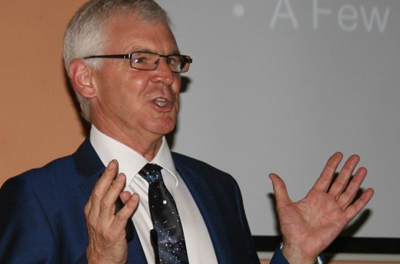University of Liverpool professor presents on astronomy

A visiting lecturer from University of Liverpool in England gave an insightful presentation on the topic ‘Stars that go Bang in the Night’ at University of Botswana Health Science Auditorium on February 22, 2018.
His talk captured, among others, the scale and content of the universe such as observing new stars, novae, super novae and gamma ray bursts, and Botswana’s future prospects in astronomy. He also touched on sophisticated observatory projects which will be part of major international projects to be located in Botswana (Square Kilometer Array) and the formation of the Botswana Astronomy Society.
Professor Bode set the audience off on a journey to the expanding universe. He described the main types of exploding stars and looked at some of the history of their observation, stretching back to over 2000 years. He also gave an overview of the solar system and the relative size, distance and volume of the earth, moon, sun, Jupiter and the Pleiades (seven sisters) cluster of stars.
He further talked about the scale of the Milky Way, it being dwarf compared to other systems. He then took the audience to explore how such stars were thought to explode and why their study was so important.
During question time, he answered questions from a wide range speakers, mostly youthful minds and gave detail to how useful astronomy was to day to day life and the powerful black holes that could transport humanity to a whole different world.
On Botswana’s future prospects, he explained about the Square Kilometre Array - the world’s largest ever ground-based astronomy project, and one in which Botswana was destined to make valuable contribution. He also mentioned that amateur astronomers using their telescopes in their backyards still made a valuable contribution to the understanding of astronomy.